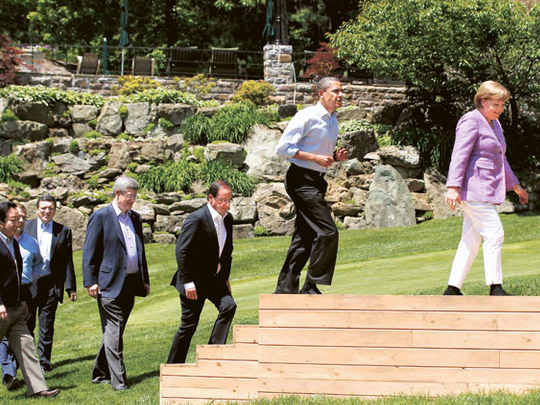
The G8 summit at Camp David, which concluded on Saturday, may have seemed something of an oddity — an archaic reminder of a time before the rise of the Brics (Brazil, Russia, India, China and South Africa) and the supposed decline of the western powers. But the West is still very much alive and kicking — and, driven by its most dynamic members, has a chance of remaining on the top of the heap for the foreseeable future.
The West is not in decline, at least not in its entirety. Rather, the financial crisis has created a two-speed West. Four large countries — Germany, South Korea, Turkey, and the United States — are actually increasing their international influence, while the others are stuck in a rut.
Ironically, America's obituary as a great power has repeatedly been written over the past three years even as it has grown stronger on multiple fronts. US influence in Asia has risen at a rapid clip since 2008, driven largely by regional anxiety about Chinese assertiveness.
Paradoxically, Chinese economic growth has weakened its own geopolitical position and benefited the United States. Such are the ways of world politics. The US is rising in other areas too. On national security, the US position is also stronger than it has been in many years. The US military and intelligence services have shown impressive dynamism in bringing Al Qaida to the brink of total defeat, something many analysts believed unlikely only a few years ago.
Weak economy
America's greatest vulnerability remains its weak economy. Significant challenges lie ahead, but it is worth noting that the United States has significantly outperformed the Eurozone and has better prospects for growth than most other western states. It remains a hub of innovation: Just consider the rise of social media and the technology-driven exploration for shale gas.
Over the long term, the fiscal challenges confronting the United States must be weighed against the very real — and very underestimated — internal strains on the Chinese and Indian economies. It's not just the United States that is propping up the West. Germany stands apart as a rising power amidst a weakened Europe. Its unemployment rate is at a post-Cold War low and its timely market reforms have allowed it to export its way out of the recession.
The euro crisis is Germany's greatest challenge but, ironically, it has also made Germany the continent's preeminent diplomatic and geoeconomic power: For better or worse, Chancellor Angela Merkel's government has won argument after argument about the future direction of the EU, often despite deep reservations from other member states. Francois Hollande's election in France will complicate but not erode Merkel's position. And even if she loses power next year — an unlikely prospect despite her recent setbacks in regional elections — a different German leader will continue to profit from Germany's economic strength within Europe.
In East Asia, South Korea's strong economic performance since the financial crisis led some analysts to argue it should be added to the BRICs, but as one of America's oldest and most reliable allies, it belongs in the West's column. It has become a powerhouse of high-end manufacturing and is on course to become richer than Japan in per capita terms within the next five years.
Turkey, a longstanding US ally and Nato member, is the fourth member of the rising West. Prime Minister Recep Tayyip Erdogan has transformed Turkey into a regional powerhouse — its economy has more than tripled under his watch, registering growth rates on par with China. After years of eschewing its Muslim identity, Turkey is emerging as a model, albeit an imperfect one, for Islamic democrats in the Arab world.
But even as these four countries have expanded their influence, the West is also hobbled by four countries that have yet to recover from the financial crisis: Britain, France, Italy, and Japan.
All suffer from lower growth rates than the rising West and, unlike the United States, they have not compensated for economic weakness with bold advances in other areas.
Britain and France tried to take the initiative with the Libya intervention, but the war merely illustrated their yawning technological shortcomings, and showed how heavily Nato allies rely on US airpower. Britain has the best chance to join the rising West if it can turn its economy around.
The rising West is a force to be reckoned with. It is no coincidence that US President Barack Obama has been closer to the leaders of his fellow rising western states than to the leaders of the rest; he named South Korean President Lee Myung Bak and Erdogan as two of his closest international allies.
So don't write off the West yet. The rising powers in the developed world will not always agree, but when they do they will be hard to resist. And they will be important interlocutors for the BRICS as they engage the western order. Unfortunately, the G8 summit is unlikely to harness their power — Turkey and South Korea's leaders are at home.
Perhaps these rising powers need an acronym if they are to be taken seriously. Is it time for the BRICS to meet the GUTS of the West?
— Washington Post
Bruce Jones is director of the Managing Global Order programme at Brookings and of the NYU Centre on International Cooperation.








